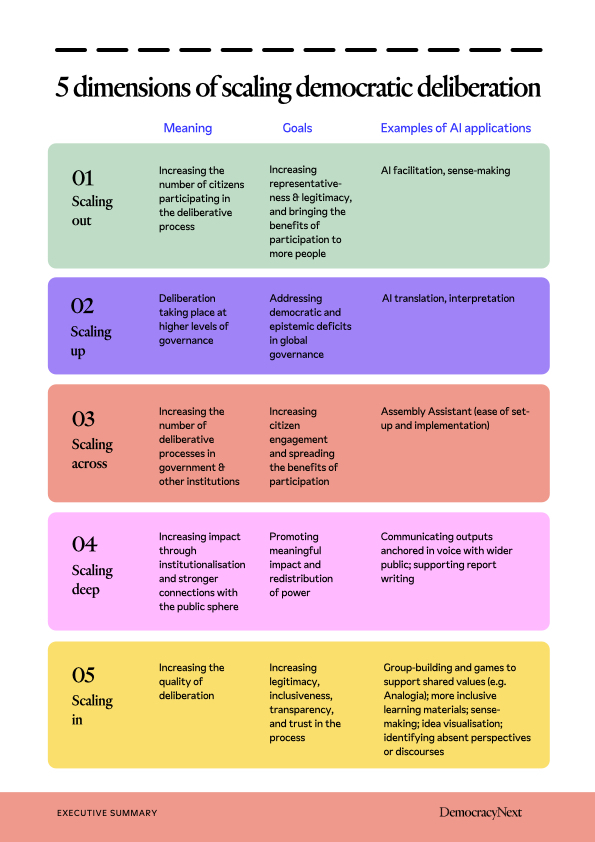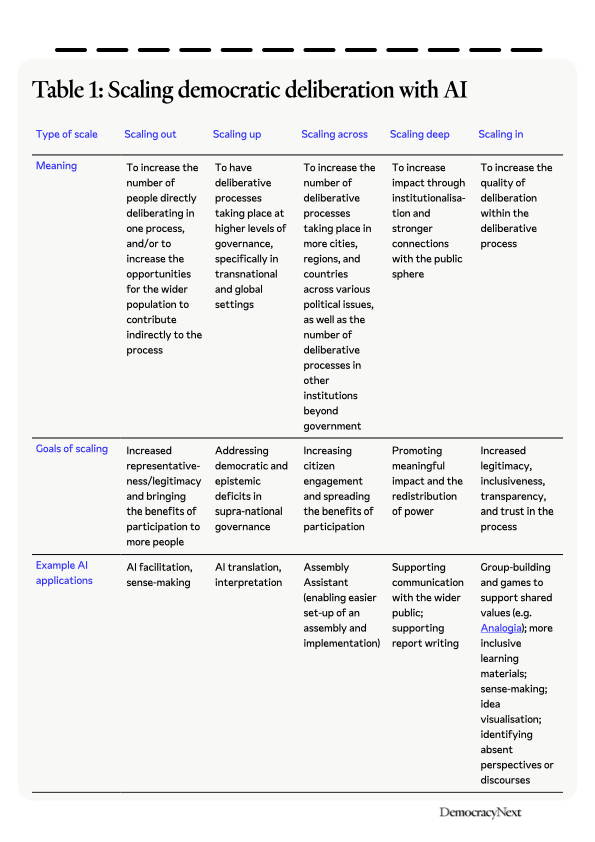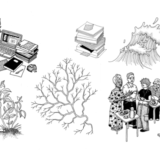As a field, we are still at the very early stages of exploring the role of AI within democratic deliberation, yet the speed of AI development and its potential to transform many aspects of society presents an urgency to our task. As a result, there is so much learning and experimentation that is required to effectively navigate the opportunities and challenges that AI integration brings. We hope that by breaking down these five dimensions of scale, identifying their goals, and outlining some potential AI applications to support them provides a shared vocabulary for the field to more precisely and effectively grapple with AI’s role in scaling democratic deliberation.
Now, we offer some reflections on the role that we see for AI in supporting meaningful future trajectories for scaling democratic deliberation. In particular, we make two points: (a) whilst keeping a critical eye on AI’s limitations and risks, we should develop a broad repertoire of deliberative technologies that can support these dimensions of scaling; and (b) beyond technological innovation, we should develop the civic infrastructure that is necessary to support real-world impact from tech-enhanced deliberative processes. We realise that we cannot unpack these points fully here; each is raised with corresponding areas for future research that we intend to pick up in subsequent publications.
4.1 Expanding our repertoire of critically informed deliberative technologies
Within the field today, much of the energy is going towards how we can use AI to directly scale out democratic deliberation to many more people. This has been reflected in the academic literature, where scaling is often synonymous with headcount. Scholars and practitioners have also been increasingly interested in mass online deliberation platforms and artificial facilitation.
We are concerned that using AI to scale out deliberation in this way may hollow out the richness of deliberative processes and mean that we lose sight of the first-order goals outlined in the introduction, such as strengthening collective agency for the sake of improving democratic resilience. In particular, building trust, understanding and a sense of togetherness – all core components of quality deliberation – takes space, time, and energy. It requires citizens being able to claim ‘ownership’ over the conditions under which they are deliberating, such as by setting the agenda for the deliberative process and establishing the norms of communication. It also requires citizens being able to bond and learn from one another between formal sessions, such as over coffee or walking between venues. We have seen so many cases in practice where bringing diverse groups of people from all walks of life into a shared space can be a transformative experience for those involved. As group sizes scale out through the deployment of AI, we are concerned that these relational dynamics that are so crucial for promoting quality deliberation, building trust, and mending the fabric of democracy will be far harder to enable.
Although we understand that there are notable critiques of smaller-scale forums, we also believe that there is something necessary and important about them: they provide the unique conditions for high quality deliberation amongst diverse groups that are otherwise rare in democratic systems, and enable transformative kinds of relationships and experiences that are much harder to promote as processes scale out.
That said, we do not oppose explorations of using AI to scale out democratic deliberation; there are significant considerations around how scaling out could help close potential legitimacy deficits in deliberative processes, and technological advancements may alleviate some of the concerns we have raised. Indeed, amongst other things, research suggests that scaled out processes can support more reflective voting at elections (Fishkin et al., 2025), and there are important ways AI could be used to enable indirect input from the wider public into deliberative processes. As such, at this very early stage of exploration, there is plenty of space for more learning and experimentation around using AI to scale out deliberation.
Rather, our core point is that we need to develop a broad and critically-informed repertoire of deliberative technologies that support and complement deliberative processes across the five dimensions of scaling. A holistic view of scale should guide technological innovation, and this should be reflected in broader explorations around the role that AI can play in increasing the quality, impact, and number of deliberative processes, as well as the number of citizens they reach.
Furthermore, just as we presented some concerns around using AI for scaling out, we must also take this critical eye to any other instance of AI integration into the deliberative process. Amongst other things, limited transparency, the excessive influence of technology, problematic biases, and how citizens perceive AI integration are all essential considerations, and the effects of AI integration need to be carefully weighed up with the specific context and goals of a given deliberative process (McKinney, 2024). Therefore, as we expand our repertoire of deliberative technologies across these dimensions of scale, we also need to expand our critical understanding of the new concerns and challenges that AI integration brings, and reflect on the extent to which these can be navigated effectively.
To this end, an important next step for action-orientated research is to rigorously map out and critically analyse AI applications across the full life cycle of deliberative processes whilst keeping this holistic understanding of scale in mind. From process planning and inclusive learning to quality deliberation and meaningful impact, what AI applications could help address existing challenges facing deliberative processes, what kind(s) of scale do they support in doing so, and what critical concerns do they raise?
To answer these questions, we plan to convene technologists and deliberative democracy experts to do a critical analysis of potential AI applications across the full life cycle of deliberative processes and map these onto the five dimensions of scaling identified. Next steps beyond that could be to develop an empirical evaluation framework for assessing AI’s impact across the five dimensions, and to develop guiding principles for navigating the opportunities and risks that AI integration brings to deliberative processes.
Ultimately, our aim is to extend our collective understanding, and guide practitioner innovation, around a broad repertoire of deliberative technologies to support a holistic and critically-informed approach to scaling democratic deliberation with technology.
4.2 The limits of AI and the importance of civic infrastructure
Expanding the repertoire of deliberative technologies is a necessary step towards meaningfully scaling democratic deliberation, though it is not sufficient in itself. Scaling democratic deliberation is not susceptible to a technological fix alone; it requires careful technological integration alongside broader processes of social and political change. We cannot overlook the contextual, relational, and time-intensive work that is required to advocate for, deliver, and connect high-quality deliberative processes to decision-making for sustained impact across governance issues. Discussions of AI’s role in scaling democratic deliberation should not overlook this, and therefore we need to centre the combination of the technological and ‘non-technological’ in meaningfully scaling democratic deliberation.
Even if we could use AI to scale out democratic deliberation to the ‘masses’, this can only ever form one part of the broader challenge of meaningfully scaling deliberation. Deliberative processes should also be connected to and influence sites of power, encourage participation and engagement from the politically marginalised, and occur across a plurality of political issues that affect our lives. Whilst AI and future AI advances may be able to help address these challenges, they are not simply technological challenges; they require civic infrastructure to support real-world change and impact. For example, amongst many other considerations, we need to deepen and strengthen connections between deliberative bodies and public officials, grow peer-to-peer learning and community networks across and within policy issues, and develop and promote the political and social mechanisms that support and equip individuals from across society to participate in deliberative processes.
There are limits to AI’s potential for scaling deliberation, and therefore exploring the civic infrastructure that is required for catalysing scaling is necessary. To this end, in a forthcoming paper we are planning to do a deep dive into what we consider as a leading example of robust civic infrastructure for scaling deliberative practice: Arantzazulab, a democracy innovation lab in Spain’s Basque Country.
Launched in 2020, they have achieved outsized impact in a short period of time. Arantzazulab plays a key role in institutionalising citizens’ assemblies and other forms of deliberative processes, nurturing cross-regional and cross-sectoral networks, facilitating peer-to-peer learning, conducting research, and storytelling. Their co-governance, operating, and co-funding model is unique, and they have a physical presence, which are both likely contributors to their success.
Five years ago, there were no assemblies in the Basque Country. Today, thanks to Arantzazulab’s efforts, there are examples of one-off and permanent assemblies at local and provincial levels, the Basque autonomous community government is exploring how to incorporate deliberative democracy in their way of engaging citizens and the energy and climate change legislation suggests the creation of a permanent climate assembly. Furthermore, more municipalities have expressed interest in establishing assemblies, the number of people with facilitation and organisation skills has multiplied, and Arantzazulab – in a collaboration with DemocracyNext – is also spreading the ideas of sortition and deliberation to Mondragon Corporation, where there will be experiments in two cooperatives to apply the principles of deliberative democracy to their governance and decision-making in 2025. Such scaling efforts require deep relational and strategic work.
In our next paper, we intend to unpack the mechanisms that are behind the success of this model, distinguishing between what can be replicated elsewhere and what is context-specific to the Basque Country. We may also explore a few additional examples, such as We Do Democracy in Denmark, to further expand our understanding of the crucial role that civic infrastructure plays in catalysing scaling beyond and alongside AI.






